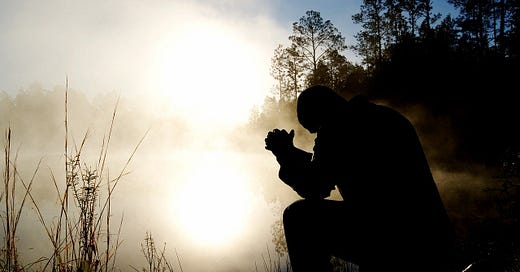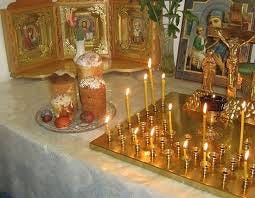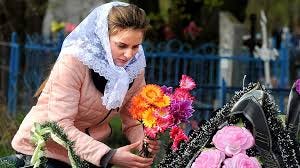“We must pray. By prayer and the word of God every filth is cleansed. The soul cannot be reconciled with life and is consoled only through prayer. Without prayer the soul is dead to grace.”
St. Nectarius of Optina
Acts 4:1-10
IN THOSE DAYS, while the apostles were speaking to the people, the priests and the captain of the temple and the Sadducees came upon them, annoyed because they were teaching the people and proclaiming in Jesus the resurrection from the dead. And they arrested them and put them in custody until the morrow, for it was already evening. But many of those who heard the word believed; and the number of the men came to about five thousand.
On the morrow their rulers and elders and scribes were gathered together in Jerusalem, with Annas the high priest and Caiaphas and John and Alexander, and all who were of the high-priestly family. And when they had set them in the midst, they inquired, “By what power or by what name did you do this?” Then Peter, filled with the Holy Spirit, said to them, “Rulers of the people and elders, if we are being examined today concerning a good deed done to a cripple, by what means this man has been healed, be it known to you all, and to all the people of Israel, that by the name of Jesus Christ of Nazareth, whom you crucified, whom God raised from the dead, by him this man is standing before you well.”
John 3:16-21
The Lord said to his disciples: “For God so loved the world that he gave his only Son, that whoever believes in him should not perish but have eternal life. For God sent the Son into the world, not to condemn the world, but that the world might be saved through him. He who believes in him is not condemned; he who does not believe is condemned already, because he has not believed in the name of the only Son of God. And this is the judgment, that the light has come into the world, and men loved darkness rather than light, because their deeds were evil. For every one who does evil hates the light, and does not come to the light, lest his deeds should be exposed. But he who does what is true comes to the light, that it may be clearly seen that these deeds have been wrought in God.”
Venerable Nectarius of Optina
The Elder Nectarius was born in the city of Yelets in the Orel province, the son of Basil and Elena Tikhonov. He was given the name Nicholas at his baptism. The year of his birth is uncertain, variously given as 1853, 1857, or 1858. His father worked in a mill and died when Nicholas was seven years old. Nicholas was close to his mother, who raised him in a strict, but loving manner. She arranged for him to work in a shop of a merchant where by the age of seventeen he was the youngest steward. His mother also died while he was still young, leaving him an orphan.
At the time Schema-Nun Theoctista, a spiritual daughter of St. Tikhon of Zadonsk lived in Yelets and was a popular advisor to the people of town. Anticipating a marriage of Nicholas to his daughter of one of his workers, the merchant advised Nicholas go to the nun for a blessing. This he did. But instead of marriage, the Schema-nun advised him to go to Optina Monastery to see Fr. Hilarion. Nicholas followed her advise and arrived at Optina in 1876 with only a copy of the Gospel in his knapsack.
After meeting the superior of the skete, Fr. Hilarion, he was sent to the Elder Ambrose who saw Nicholas immediately and spoke with him for two hours. Following their conversation, Nicholas remained in the skete and never returned home. For the next twenty years he was the disciple of his spiritual father Anatolius (Zertsalov) although at times he sought the counsel of the Elder Ambrose. These elders led Nicholas along the strict path of monasticism.
His first obedience was the care of the flowers. Later, he was appointed sacristan. Although his cell opened into the church, Nicholas spoke to no one except to the Elders Anatolius and Ambrose for twenty five years. His reading was not only of spiritual texts but also the world literature of Milton, Dante, Shakespeare, Pushkin, Tolstoy, and others as well as the world of science, mathematics, and art. In conversations he was able to relate all human knowledge to the spiritual world and the wonder of God's gift of creativity.
In 1887, Nicholas received the mantia and the name Nectarius. In 1894, he was ordained a deacon and in 1898, he was ordained a hieromonk by Bp. Macarius of Kaluga. In 1913, when the Optina community met to elect a new leader, they chose for eldership the Archimandrite Agapit, who was retired. But, he refused and named his disciple Nectarius instead. When he refused the archimandrite directed him to accept the obedience, to which the reluctant Nectarius accepted.
In 1917, as troubles enveloped Russia, Fr. Nectarius prophesied the coming of a hard time, noting that the Tsar had suffered humiliation for his mistakes, and that 1918 would be worst as His Majesty and his family would become martyrs.
The Elder took a firm stand against the heresy of renovationism, forbidding his spiritual children from entering the churches seized by the "Living Church".
Prior to Pascha in 1923, the Bolsheviks closed the Monastery at Optina. Sealing the churches, the Bolsheviks proceeded to desecrate the graves of the elders and turn the skete into a resort for the Soviet upper class. Fr. Nectarius was arrested and jailed in the prison hospital in Kozelsk. Released later from the prison, Fr. Nectarius moved into the home of a peasant in the village of Kholmischcha in the Bryansk region. While he managed to preserve a radiant peace during which many of his spiritual children visited him, his life was difficult and full of threats from the Soviet authorities including threats of deportation to Kamchatka.
Fr. Nectarius reposed quietly on May 12, 1928 in Kholmischcha. He was buried, after having received the last rites by Fr. Adrian Rymarenko later Archbishop Andrew of Novo-Diveyevo, in the local village cemetery on May 16. On July 16, 1989, his relics were translated to Optina and placed in the Cathedral of the Entry of the Mother of God into the Temple.
Radonitsa, the Orthodox Rejoicing Day for the Dead
Source: https://www.daysoftheyear.com/days/radonitsa/
How to Observe Radonitsa
Celebrating Radonitsa can be a unique experience filled with traditions and a touch of joyful remembrance. Here are a few quirky ideas to make the most out of this special day.
Visit and Feast
Pack up a picnic basket with some traditional goodies and head to the cemetery.
Yes, you read that right! Gather around the graves of your loved ones, and share stories, laughter, and maybe even some funny family anecdotes. It’s all about honoring their memory while embracing the lively spirit of the day.
Colorful Offerings
Bring some beautifully decorated eggs, a symbol of resurrection and life, and place them on the graves. Maybe even get creative and personalize the eggs with drawings or messages. It’s a small, colorful way to show that they are still a part of your family celebrations.
Joyful Tunes
Sing a cheerful song or two. This might sound unusual, but it’s perfectly in the spirit of Radonitsa. If you’re not sure what to sing, try a traditional folk tune, or just hum a happy melody.
Music has a way of connecting us to the past, and it can add a beautiful, uplifting note to the day.
Sweet Treats for the Soul
Bake or bring a dish that your loved one enjoyed. Share it with family, or leave a small portion as an offering.
It’s a heartfelt gesture that acknowledges their continued presence in your life. Plus, who doesn’t enjoy a reason to bake something delicious?
Share and Give
It’s customary to give alms on this day, so consider donating to a cause or giving to someone in need. It’s a lovely way to spread joy and do something good in memory of those who have passed. That’s like sending a little extra love from them to the world.
Each of these suggestions adds a unique touch to Radonitsa, making it a day filled with warmth, memories, and a hint of celebration. It’s a beautiful blend of honoring the past while enjoying the present with those who remain
Christ is risen! Indeed He is risen!
This week’s calendar reminders:
Monday 4/28: Matins 8:30 a.m.
Tuesday 4/29: no services or events
Wednesday 4/30: no services or events
Thursday 5/1:
Friday 5/2:
Saturday 4/26: Great Vespers 6 p.m.
Sunday 4/27: Divine Liturgy 9:15 a.m.
CLICK BELOW to donate online:
Christ the Savior Orthodox Church is located in Southbury, Connecticut, and is part of the New England Diocese of the Orthodox Church of America.
Mailing address: Christ the Savior Church, 1070 Roxbury Road, Southbury, CT 06488
PLEASE DONATE to help our parish do the work of the Lord, thrive and grow, and extend the Kingdom of God. May the Lord bless your generosity!
Fr. Moses Locke can be reached at frmoseslocke@gmail.com












